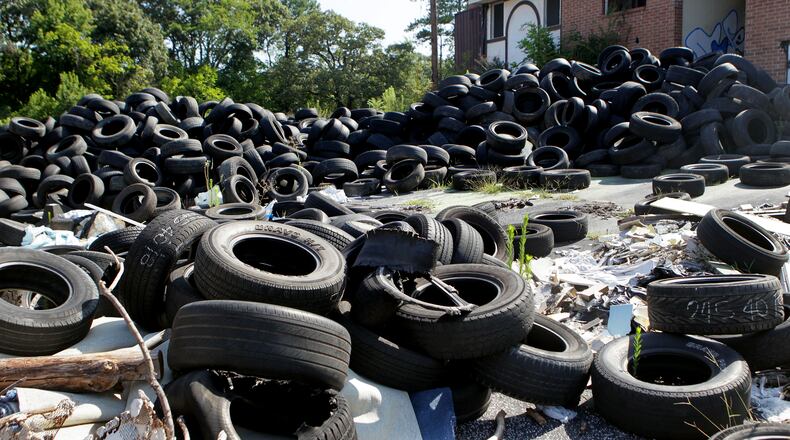Auditors say the state is doing a better job of inspecting scrap tire generators but is still diverting more than half of the money it receives from Georgia’s $1 fee on new tires away from its intended purpose, cleaning up dumps.
That fact may play a role in debate during the 2019 session, when the General Assembly will have to decide whether to continue charging Georgians the fee for each new tire.
State auditors this week released a report on how the Environmental Protection Division did in responding to a 2015 review of the Solid Waste Trust Fund. The fund — which gets its money from the fee — is used to police and clean up tire dump.
The original analysis by the Georgia Department of Audits and Accounts said while the so-called “scrap tire fee” that consumers pay when they buy new tires had been unchanged, the number of cleanups and other activities funded by the Solid Waste Trust Fund had dropped over 10 years.
It said little action had been taken to clean up hundreds of thousands of scrap tires in hundreds of dumps, and that the state was likely not collecting all the tire fee money that was due from retailers.
The follow-up audit said the EPD is doing a better job inspecting potential scrap tire producers and tracking enforcement actions to clean up dumps, which are an eyesore and incubators for mosquitoes.
“However, our reviews found that many parties had not responded to notices of violations sent by the program in 2017,” auditors said. “Officials indicated that the workload makes it difficult to follow up.”
The follow-up audit said the program has not developed a method of estimating whether total fee payments made by retailers are accurate.
The agency agreed with the auditor’s findings.
The tire fee is up for renewal in 2019, and auditors said before then, the state needs to determine whether Georgians should continue paying it.
The diversion of fee money has become an annual debate at the General Assembly. While the $1 fee is supposed to be used for cleaning up tire dumps, only $3.2 million of the $7.2 million collected in 2017 went toward that purpose, according to auditors.
The rest goes into the state's general fund and can be spent on anything lawmakers decide.
The Association County Commissioners of Georgia says about $200 million or so has been diverted from landfill fees and the tire fee. Meanwhile counties don’t always have the money they need to clean up tire dumps, landfills and hazardous waste sites.
The same thing has happened with other fees, fines and court add-ons that were meant to go toward things such as police training and teen driver education.
The Georgia House this year voted nearly unanimously for an "anti-bait-and-switch" measure that would allow the General Assembly to mandate that fees go toward their intended purposes.
But the measure stalled in the Senate, and Gov. Nathan Deal’s administration has traditionally opposed the idea. Opponents worry they won’t have the flexibility to divert tens of millions of dollars in fee revenue when they think the state needs to spend the money elsewhere.
Supporters say the problem has been around for decades, but it grew worse during the Great Recession, when Gov. Sonny Perdue and lawmakers desperately needed every dime they could get to keep state government afloat without raising taxes.
Previously: State lawmakers have approved various fees and court add-ons since the 1990s to pay for things such as hazardous waste cleanups and teen driver education. But much of the money has been diverted to other priorities.
Now: A follow-up state audit says the state should take a closer look at the $1 fee consumers pay when they buy new tires since more than half of the money collected doesn't go toward its intended purpose, cleaning up tire dumps.
Next: State lawmakers will consider during the 2019 General Assembly session whether to continue to charge the fee and will likely debate a measure that would force officials to spend fee and add-on money where it was intended to be spent.
About the Author
Keep Reading
The Latest
Featured




